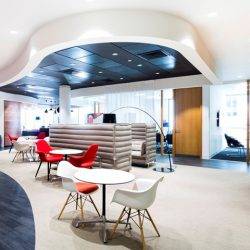March 20, 2017
Half of UK employers have now introduced wellbeing schemes 0
 Nearly two thirds (63 percent) of UK employees experience stress in their jobs, according to a new study of workplace wellbeing by Happiness Works on behalf of Robert Half UK. Of those who find their roles demanding, nearly one in 10 said their job was very stressful. To address the high-levels of stress and other issues among employees, organisations are introducing wellbeing initiatives to support the physical and mental health of employees at work. Nearly half (48 percent) of businesses offer tools designed to promote wellbeing in the workplace, with one in seven providing stress management seminars or training and annual leave for personal and mental wellbeing. Other initiatives being introduced include counselling (17 percent), leaving work early on a Friday (17 percent) and limiting the amount of overtime that employees can do (11 percent).
Nearly two thirds (63 percent) of UK employees experience stress in their jobs, according to a new study of workplace wellbeing by Happiness Works on behalf of Robert Half UK. Of those who find their roles demanding, nearly one in 10 said their job was very stressful. To address the high-levels of stress and other issues among employees, organisations are introducing wellbeing initiatives to support the physical and mental health of employees at work. Nearly half (48 percent) of businesses offer tools designed to promote wellbeing in the workplace, with one in seven providing stress management seminars or training and annual leave for personal and mental wellbeing. Other initiatives being introduced include counselling (17 percent), leaving work early on a Friday (17 percent) and limiting the amount of overtime that employees can do (11 percent).
(more…)












 Amos Tversky and Daniel Kahneman introduced the concept of Loss Aversion in 1984, highlighting people’s tendency to strongly prefer avoiding losses to acquiring gains. Most studies suggest that losses are twice as powerful, psychologically, as gains. Lose £100 and we will feel a remorse that easily outweighs winning £100. In a similar fashion we find it very hard to see future positives when confronted with short term loses. We understand easily what we have lost but cannot imagine what there is to be gained. Furthermore, as Frederic Bastiat wrote in an 1850 paper, “That Which is Seen, and That Which is Not Seen”, man has a tendency to “pursue a small present good, which will be followed by a great evil to come, rather than a great good to come, at the risk of a small present evil”. Put these together and it is no wonder that, by and large, the future of work, corporate real estate and the workplace is so widely misunderstood.
Amos Tversky and Daniel Kahneman introduced the concept of Loss Aversion in 1984, highlighting people’s tendency to strongly prefer avoiding losses to acquiring gains. Most studies suggest that losses are twice as powerful, psychologically, as gains. Lose £100 and we will feel a remorse that easily outweighs winning £100. In a similar fashion we find it very hard to see future positives when confronted with short term loses. We understand easily what we have lost but cannot imagine what there is to be gained. Furthermore, as Frederic Bastiat wrote in an 1850 paper, “That Which is Seen, and That Which is Not Seen”, man has a tendency to “pursue a small present good, which will be followed by a great evil to come, rather than a great good to come, at the risk of a small present evil”. Put these together and it is no wonder that, by and large, the future of work, corporate real estate and the workplace is so widely misunderstood.



















December 23, 2016
Presenteeism doesn’t aid productivity, so employers should set workers free 0
by Mark Eltringham • Comment, Flexible working
(more…)